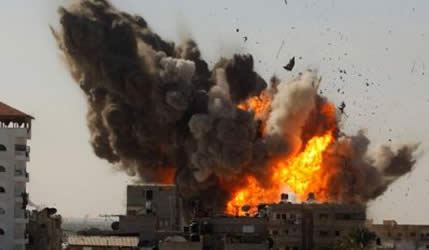Middle East ravaged by US proxy wars

Bill Van Auken Correspondent
The result of this policy can be seen in the involvement of virtually every country of the Middle East in one or another war and the palpable threat that these conflicts will coalesce into a region-wide conflagration that could, in turn, provoke World War III.
WITH the launching of the US-backed military intervention in Yemen, virtually the entire Middle East is engulfed by military conflict, a state of affairs that has no precedent, with the possible exception of the two world wars fought in the 20th century.
Washington’s pursuit of policies from one conflict to the next that are seemingly at odds with one another has provoked mounting expressions of concern from major US think tanks and editorial boards – not to mention nominal allies in Europe – over “strategic incoherence”.
To describe as glaring the contradictions that riddle US foreign policy in the Middle East does not do them justice.
In Yemen, the Obama administration has announced its full backing, with the provision of logistical assistance, arms (including cluster bombs) and targeting intelligence, to an intervention spearheaded by Saudi Arabia, the other Sunni oil monarchies and the Egyptian regime of Gen Abdel Fattah al-Sisi.
This coalition of dictatorships and crowned tyrants is waging a war against the most impoverished country in the Arab world. Their aim in bombing cities and killing civilians is to contain the influence of Iran, which has provided support to the Zaydi Shiite Houthi rebels who overthrew President Abd Rabbuh Mansour Hadi, a puppet installed by Washington and Riyadh.
In Iraq, US warplanes have been bombing Tikrit, the hometown of the ousted and murdered Iraqi president, Saddam Hussein, which is now controlled by the Islamic State of Iraq and Syria (ISIS). This operation is providing air support to a besieging force comprised overwhelmingly of Shiite militias operating with Iranian support and advisors.
While the Pentagon had conditioned the air strikes on the withdrawal of these militias, some of which had resisted the eight-year US occupation of Iraq, it is widely acknowledged that this was strictly for the sake of appearances. The Shi’ite forces remain the principal fighting force on the ground.
Meanwhile, across the border in Syria, Washington is pursuing a policy seemingly at odds with itself, on the one hand pledging to arm and train militias seeking to overthrow the government of President Bashar al-Assad, whose closest ally is Iran, and, on the other, carrying out air strikes against both ISIS and the Al Qaeda-affiliated al-Nusra Front, which together are the principal armed opponents of the Assad regime.
At the same time, negotiations led by US Secretary of State John Kerry in Switzerland are going down to the wire in a bid to secure an agreement with Iran that would curtail its nuclear program in exchange for the lifting (or partial lifting) of punishing economic sanctions imposed by Washington and its European allies. Failure to achieve such a deal could spell a turn towards more direct US military aggression against Iran. Success could well prove to be a tactical preparation for the same thing.
It is now 12 years since the Bush administration launched its war against Iraq. At the time, it claimed that its war of aggression was being waged to eliminate “weapons of mass destruction” and the threat posed by ties between the government of Saddam Hussein and Al-Qaeda. Both claims were lies. There were neither weapons nor any connections, outside of mutual hostility, between the secular regime in Baghdad and the Islamist group.
At the same time, Bush portrayed the US intervention as a liberating mission that would bring “democracy” to Iraq and beyond. “The establishment of a free Iraq in the heart of the Middle East will be a watershed event in the global democratic revolution,” he proclaimed in the early stages of the US military occupation.
That the US invasion was a “watershed event” no one can deny. It ushered in a period of wholesale carnage that claimed over 1 million Iraqi lives, destroyed the country’s economic and social infrastructure, and provoked bitter sectarian struggles between Shiites, Sunnis and Kurds as part of a deliberate police of divide and rule.
For Iraq, the war was a catastrophe. For the US, it proved to be a debacle. Costing the lives of 4 500 American soldiers, injuring tens of thousands more, and consuming trillions of dollars in military expenditures, it succeeded only in creating the social and political conditions for ISIS (an offshoot of Al-Qaeda) to overrun more than one third of the country – a country that had had no serious Islamist presence prior to the 2003 invasion.
The result of this policy can be seen in the involvement of virtually every country of the Middle East in one or another war and the palpable threat that these conflicts will coalesce into a region-wide conflagration that could, in turn, provoke World War III. – wsws .









Comments